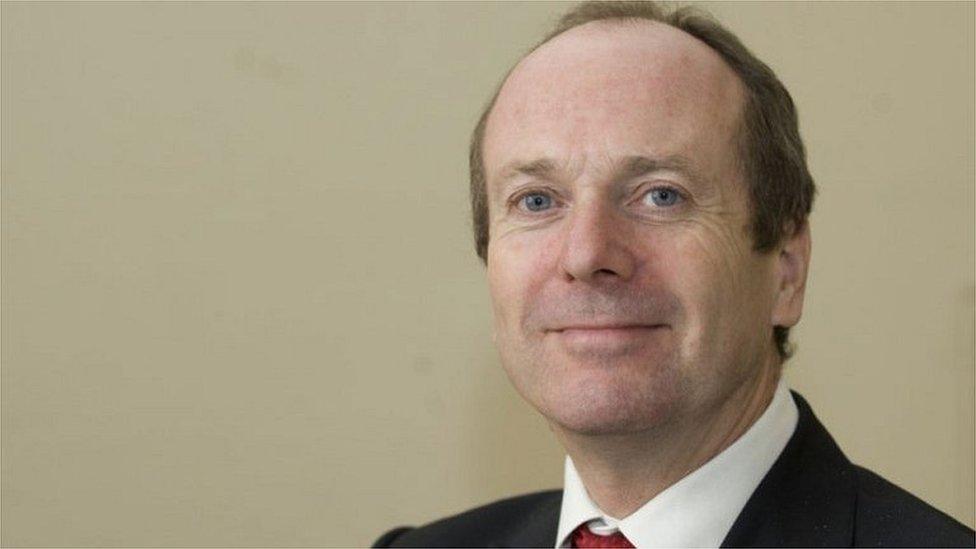Civil servant who worked for Greensill rejects 'double-hatting' label
- Published

Bill Crothers said his two jobs did not involve "double-hatting"
An ex-civil servant who worked for Greensill Capital and the government at the same time says he "followed the rules" and did nothing wrong.
Bill Crothers said his employment by the now collapsed finance firm had been "very part-time" - and he only held two roles for a three-month period.
"In the press the phrase 'double-hatting' has been used and I just feel that is not appropriate," he told MPs.
The late Cabinet Secretary, Sir Jeremy Heywood, had influenced his decisions, he added.
Historic links between government and Greensill Capital have come under huge scrutiny in recent months.
Former Prime Minister David Cameron has been criticised over his work lobbying senior ministers for contracts on the company's behalf after leaving Downing Street.
It also emerged that Mr Crothers had joined Greensill as an adviser in September 2015, while continuing to work for the government, after this was cleared by the Cabinet Office.
He left his civil service job in November that year and went on to become a director of Greensill the following year.
Appearing before the Commons Public Administration and Constitutional Affairs Committee, Mr Crothers said: "My intention was always to follow the rules in spirit and form. I was transparent in all that I did and no conflict [of interest] happened."
He said Sir Jeremy, who died in 2018, had been "extremely positive" about Greensill's founder, the Australian financier Lex Greensill, and that this had "influenced" him, as he regarded Sir Jeremy as a man "of the highest integrity".
When joining the company, Mr Crothers said he had been told he did not need to refer this to the Advisory Committee on Business Appointments (Acoba), which advises senior civil servants and ministers on taking jobs in the private sector.
He told the committee his initial plan had been to stand down as the government's chief commercial officer and immediately "contract back" as an adviser, while at the same time working for Greensill.

Sir Jeremy Heywood was impressed by Greensill, MPs heard
But the Whitehall ethics supremo at the time, Sue Gray, advised that it would be more appropriate instead to remain a civil servant "part-time" while taking on the Greensill role, he added.
As he was already working within Whitehall, this would mean there was no need to go through Acoba, Mr Crothers said.
He rejected claims he had been "double-hatting", as his dual role had been a "transitional arrangement", while the Greensill work was "very part-time", amounting to about a day's worth each month.
His Civil Service work took up about two days a week, he added.
He also said that, once he had left government, he still effectively followed Acoba's rules, which prevent former ministers and civil servants from lobbying government for two years after leaving office.
Mr Crothers had not been involved in trying to secure a government contract for Greensill until January 2018, he added.
'Clever guy'
Earlier in the hearing, former Cabinet Office minister Lord Maude said Sir Jeremy had been keen to get Mr Greensill - who was taken on as an unpaid government adviser during the early days of the Conservative-Liberal Democrat coalition - involved in efforts to make economies in the aftermath of the financial crisis.
"He (Sir Jeremy) said, 'This is a clever guy who's going to help us save lots of money,'" added Lord Maude.
But Mr Greensill's main financial idea - known as supply chain finance - proved to be of little or no use to the government, Lord Maude said, calling it a "distraction at best".
Labour has called the dual employment of Mr Crothers, who stepped down as a director of Greensill Capital shortly before it went into administration earlier this year, "extraordinary and shocking".
And several reviews are taking place into matters involving lobbying and the company, which collapsed after its insurer refused to renew cover for the loans it was making.
Addressing the Treasury Committee last month, Mr Cameron said he had not broken any rules when he contacted ministers and officials.
But he admitted that he should have used "only the most formal" means, such as a letter, rather than texts and WhatsApp messages.